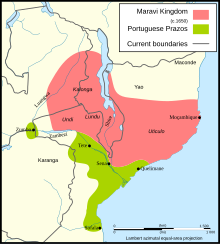| Revision as of 07:33, 14 March 2010 editEttrig (talk | contribs)Extended confirmed users, Pending changes reviewers, Rollbackers18,652 edits redundant ''sometime''← Previous edit | Revision as of 19:55, 19 October 2010 edit undo91.117.67.42 (talk)No edit summaryNext edit → | ||
| Line 25: | Line 25: | ||
| ] | ] | ||
| ] | ] | ||
| ] | |||
| ] | ] | ||
| ] | ] | ||
Revision as of 19:55, 19 October 2010

Maravi was a state established by Bantu people in the area of Lake Malawi, in present-day Malawi, in the 16th century. (The present-day name "Malawi" is said to derive from "Maravi" which itself means "fire flames") At its greatest extent, the state included territory from the Tumbuka and Tonga areas to the north to the Lower Shire in the south, and west to Luangwa and Zambezi valleys. It is also a generic name of the black tribes in Malawi, Zambia, Zimbabwe, and Mozambique.
Maravi's rulers belonged to the Phiri matriclan and held the title Kalonga. They ruled from Manthimba.
In the 19th century, the Maravi were frequently raided by their neighbors the Yao and captured for sale as slaves. David Livingstone visited Lake Nyasa in 1859, and Protestant missionaries soon followed.
Maravi peoples speak several dialects, including Chichewa (Malawi’s national language), and speak other official languages: Portuguese in Mozambique and English in Malawi, Zambia, and Zimbabwe.
See also
External links
This African history–related article is a stub. You can help Misplaced Pages by expanding it. |
This Malawi-related article is a stub. You can help Misplaced Pages by expanding it. |
This Mozambique-related article is a stub. You can help Misplaced Pages by expanding it. |